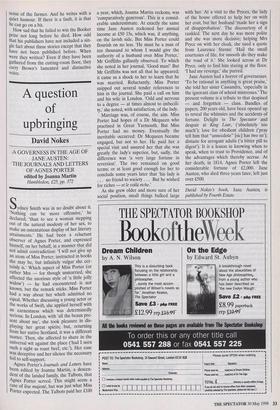A question of upbringing
David Nokes
A GOVERNESS IN THE AGE OF JANE AUSTEN: THE JOURNALS AND LETTERS OF AGNES PORTER edited by Joanna Martin Hambledon, £25, pp. 372 Sydney Smith was in no doubt about it. , Nothing can be more offensive,' he declared, 'than to see a woman stepping out of the natural modesty of her sex, to make an ostentatious display of her literary attainments.' He had been a reluctant observer of Agnes Porter, and expressed himself, on her behalf, in a manner that did not admit contradiction: 'I will not give up an atom of Miss Porter; instructed in books she may be, but infinitely vulgar she cer- tainly is.' Which aspect of Miss Porter (or rather Mrs — for though unmarried, she affected the uxorious style of 'a little jolly widow') — he had encountered is not known, but the remark sticks. Miss Porter had a way about her which admitted no equal. Whether discussing a young actor or the works of Swift, she applied herself with anearnestness which was determinedly serious. In London, with 'all the beaux pre- sent about me', she took pleasure in dis- playing her great spirits; but, returning from her native Scotland, it was a different matter. Then, she affected to share in the universal wit against the place Chad I seen such a sight as roast beef, etc.'). Her ease was deceptive and her silence the necessary foil to self-support. Agnes Porter's Journals and Letters have been edited by Joanna Martin, a descen- dent of the landed family, the Talbots, that Agnes Porter served. This might seem a case of lese rnajeste, but was just what Miss Porter expected. The Talbots paid her £100 a year, which, Joanna Martin reckons, was `comparatively generous'. This is a consid- erable underestimate. At exactly the same time Jane Austen reckoned her annual income at £50 15s, which was, if anything, on the lavish side. But Miss Porter could flourish on no less. 'He must be a man of ten thousand to whom I would give the authority of a husband over Miss Porter,' Mr Griffiths gallantly observed. To which she noted in her journal, 'Good man!' But Mr Griffiths was not all that he appeared; it came as a shock to her to learn that he was married. Reluctantly, Miss Porter snipped out several tender references to him in the journal. She paid a call on him and his wife in London. 'Odd and nervous to a degree — at times almost to imbecili- ty,' she noted, with satisfaction, of the lady.
Marriage was, of course, the aim. Miss Porter had hopes of a Dr Mcqueen who practised in Great Yarmouth. But Miss Porter had no money. Eventually the inevitable occurred: Dr Mcqueen became engaged, but not to her. He paid her a special visit and assured her that she was greatly the lady's superior, but, sadly, the difference was 'a very large fortune in reversion'. The two remained on good terms; or at least good enough for her to conclude some years later that 'his lady is . . . no friend to society . . . But he wished for riches — et le voila riche.'
As she grew older and more sure of her social position, small things bulked large with her. At a visit to the Pryces, the lady of the house offered to help her on with her coat, but her husband 'made her a sign of disapprobation'. The discourtesy of it rankled. The next day he was more polite and she was more decisive; helping Mrs Pryce on with her cloak, she used a quote from Laurence Sterne: 'Hail the small courtesies of life, for smooth do they make the road of it.' She looked across at Dr Pryce, only to find him staring at the floor. `I had my revenge,' she purred.
Jane Austen had a horror of governesses. To be rational in anything is great praise,' she told her sister Cassandra, 'especially in the ignorant class of school mistresses.' The present volume is a tribute to that despised — and forgotten — class. Bundles of papers, 200 years old, have been opened up to reveal the whimsies and the accidents of fortune. Delight in The Spectator and despair at King Lear, (`absolutely too much'); love for obedient children (`pray tell him that "annecdote" [sic] has two ns'); distaste for arrogant adults Ca bitter pill to digest'). It is a lesson in knowing when to speak, when to trust to Providence, and of the advantages which thereby accrue. At her death, in 1814, Agnes Porter left the considerable fortune of £2,000. Jane Austen, who died three years later, left just over £500.
David Nokes's book, Jane Austen, is published by Fourth Estate.


































































 Previous page
Previous page